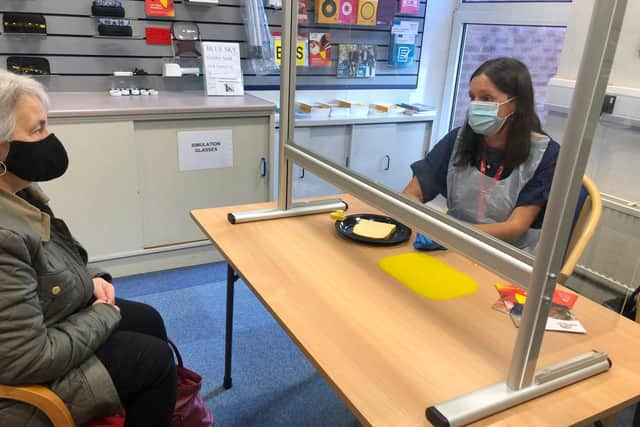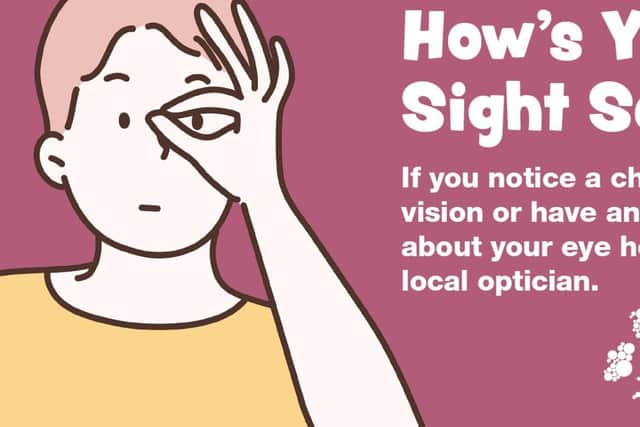National Eye Health Week: people in Lancashire are urged to take care of their eyes
and live on Freeview channel 276
National Eye Health Week is currently taking place this week, from 20-26 September, and with an estimated 7,680 working age people living with sight loss across the county, campaigners in Lancashire are urging people to take good care of their eyes.
National Eye Health week is held each year to promote regular eye tests and raise awareness of the importance of eye health, and sight loss charity Galloway's, which supports blind and partially sighted people across Lancashire and Sefton, are pushing the important message across the county.
Advertisement
Hide AdAdvertisement
Hide AdRachel Watkinson, Head of Services at Galloway’s, said: “We are passionate about providing the best practical and emotional support to help people with sight loss continue to live full and independent lives, but as we know that 50 per cent of sight loss is preventable, we are also committed to working towards reducing the risks of sight loss, so we do this by raising awareness and encouraging people to maintain healthy lifestyles and keep good eye care.


“Throughout the week, we have been highlighting important messages through our social media channels and some of our services team will be at our Brew Me Sunshine cafe in Morecambe all day today (Wednesday) and Thursday as well as Friday afternoon to talk about prevention and the importance of regular eye tests.
“Our Sight Loss Advisor Pam Whitaker will also be at North West Auctions Ltd in Lancaster on Friday from 9am to 1pm to share these key messages to the farming community.
“It really is important to take good care of your eyes, and regular tests, once every two years, are essential in detecting any potential eye conditions.
Advertisement
Hide AdAdvertisement
Hide Ad“If you would like to speak to us about any concerns you have about your eyes, please don’t hesitate to call us on 01772 744148. We are more than happy to help you.”


The Visual Impaired Forum for the Lancashire Area, a group of blind and visually impaired people from across the county, are also encouraging the importance of eye health this week.
Supported by Lancashire County Council, the VI Forum raises awareness of issues faced by the visually impaired, and their chairperson, Denise, said: “Due to the pandemic many people will not have had an up to date regular eye test, this is a vital health check for us all at any age .
“An eye test can detect changes to your eye health early and that is crucial, as being able to access early treatment for certain eye conditions such as Glaucoma, Diabetes Retinopathy and Wet Macular Degeneration, can save your sight.
Advertisement
Hide AdAdvertisement
Hide Ad“An eye test can also pick up on health concerns such as high blood pressure, which can lead to a stroke and also have an impact on your vision.


“During National Eye Health week we can all raise awareness by having a conversation with family and friends about having an eye test, and that could be the conversation that could lead to saving someone’s sight.”
A report commissioned by Specsavers this year, called ‘State of the UK’s eye health 2021’ found there were 4.2 million fewer eye tests across the UK during 2020, a drop of 23% compared with the previous 12 months.
Denise, who is visually impaired herself said: "I’d noticed a few changes in my vision but I thought it was down to my age, or the medication I take for a congenital heart condition, but it wasn’t. When my eye sight started to blur and go distorted, I rang the opticians, and he referred me to my local hospital, where I was diagnosed with macular degeneration aged 47, which anyone can get.
Advertisement
Hide AdAdvertisement
Hide Ad"People think it won’t happen to them, but sight loss can happen to anybody, at any age, at any time, if you see any changes please go to the opticians.”
The NHS currently recommends that people should have their eyes tested every two years, unless they notice any changes to their vision, in which case you should go sooner.
Top tips for maintaining good eye health, according to Galloway’s:
-Attend an opticians every two years or less if more you are at risk
-Stop smoking, as it increases the risk by 4 times.
-Maintain your 5 a day.
-Keep alcohol consumption low.
Advertisement
Hide AdAdvertisement
Hide Ad-Avoid too much screen time and use the 20-20-20 rule - every 20 mins, look away for 20 seconds at something 20 m away.
-Keep fit and exercise regularly.
-Wear protective eyewear when playing sports such as squash to protect your eyes from flying balls.
-Wear protective eyewear if you are working with hazardous or airborne materials.
-Wear safety glasses when carrying out gardening or DIY.
-Protect your eyes from harmful UV rays. Wear sunglasses/filters with CE mark or BS EN ISO 12312-1;2013.
Advertisement
Hide AdAdvertisement
Hide Ad-Use correct glasses for the right tasks – keep them clean and smudge free.
-Look after your contact lenses appropriately – use solution to clean and take out at night.
-Maintain diabetic/glaucoma medications and attend screenings or reviews.
-If you experience any pain, blurring, spots or wavy lines, contact your GP, optician, or even NHS 111 or A&E.